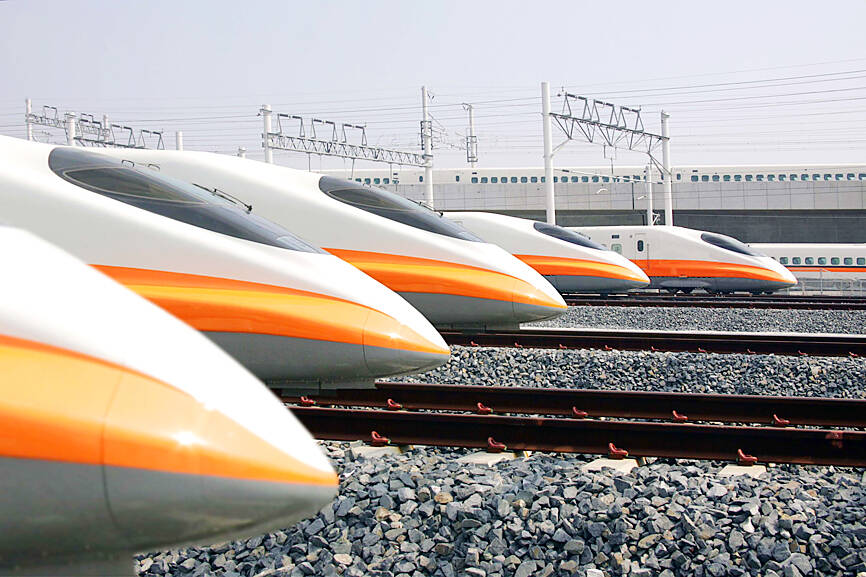Taiwan High Speed Rail Corp’s (THSRC) board of directors on Wednesday passed a resolution authorizing management to spend about NT$28.5 billion (US$930.4 million) to procure 12 sets of next-generation high-speed trains from the Hitachi Toshiba Supreme Consortium (HTSC).
The procurement of new trains has been planned since 2019 after taking into account various factors, from growth of transport volume to capacity to maintain and repair trains, flexibility in train deployment, and train occupancy rates on weekdays, weekends and holidays, THSRC said.
The deal was only finalized after the company held a public tender for the procurement for the third time in March last year, it said.

Photo courtesy of Taiwan High Speed Rail Corp via CNA
The first two tenders failed as the prices quoted by Japanese manufacturers were much higher than the market rate, the company said.
The board on Wednesday voted to grant the contract to HTSC after the company’s management reviewed tender documents prepared by contractors and engaged in multiple rounds of negotiations with companies that have priority negotiation rights, THSRC said.
Modeled after the N700S Shinkansen system, the next-generation high-speed trains would feature a more streamlined and energy-
saving design than the current 700T trains, the company said, adding that the new trains would travel faster and better serve passengers.
Each seat on the new train would be equipped with a 110V socket, and each train car would have an LCD panel to display information, double-deck luggage racks and other equipment, it said.
The agreement between THSRC and HTSC requires the contractor to begin delivering the new trains to Taiwan 42 months after it commences production, the railway operator said, adding that the first set should start operating 50 months after the project begins.
Local news media outlets reported that the first two tenders failed because Japanese contractors offered tenders of NT$5 billion per set of high-speed trains.
The deal was finalized after the price was halved to NT$2.3 billion, the reports said.
Last year, Japan-Republic of China Diet Members’ Consultative Council chairman Keiji Furuya raised the issue of THSRC’s procurement of new train cars from Japan at his meeting with President Tsai Ing-wen (蔡英).
The high-speed rail system “is a symbol of solid friendship between Taiwan and Japan, for which the two countries must cooperate,” Furuya said.

Chinese Nationalist Party (KMT) Chairman Eric Chu (朱立倫), spokeswoman Yang Chih-yu (楊智伃) and Legislator Hsieh Lung-chieh (謝龍介) would be summoned by police for questioning for leading an illegal assembly on Thursday evening last week, Minister of the Interior Liu Shyh-fang (劉世芳) said today. The three KMT officials led an assembly outside the Taipei City Prosecutors’ Office, a restricted area where public assembly is not allowed, protesting the questioning of several KMT staff and searches of KMT headquarters and offices in a recall petition forgery case. Chu, Yang and Hsieh are all suspected of contravening the Assembly and Parade Act (集會遊行法) by holding

PRAISE: Japanese visitor Takashi Kubota said the Taiwanese temple architecture images showcased in the AI Art Gallery were the most impressive displays he saw Taiwan does not have an official pavilion at the World Expo in Osaka, Japan, because of its diplomatic predicament, but the government-backed Tech World pavilion is drawing interest with its unique recreations of works by Taiwanese artists. The pavilion features an artificial intelligence (AI)-based art gallery showcasing works of famous Taiwanese artists from the Japanese colonial period using innovative technologies. Among its main simulated displays are Eastern gouache paintings by Chen Chin (陳進), Lin Yu-shan (林玉山) and Kuo Hsueh-hu (郭雪湖), who were the three young Taiwanese painters selected for the East Asian Painting exhibition in 1927. Gouache is a water-based

Taiwan would welcome the return of Honduras as a diplomatic ally if its next president decides to make such a move, Minister of Foreign Affairs Lin Chia-lung (林佳龍) said yesterday. “Of course, we would welcome Honduras if they want to restore diplomatic ties with Taiwan after their elections,” Lin said at a meeting of the legislature’s Foreign Affairs and National Defense Committee, when asked to comment on statements made by two of the three Honduran presidential candidates during the presidential campaign in the Central American country. Taiwan is paying close attention to the region as a whole in the wake of a

OFF-TARGET: More than 30,000 participants were expected to take part in the Games next month, but only 6,550 foreign and 19,400 Taiwanese athletes have registered Taipei city councilors yesterday blasted the organizers of next month’s World Masters Games over sudden timetable and venue changes, which they said have caused thousands of participants to back out of the international sporting event, among other organizational issues. They also cited visa delays and political interference by China as reasons many foreign athletes are requesting refunds for the event, to be held from May 17 to 30. Jointly organized by the Taipei and New Taipei City governments, the games have been rocked by numerous controversies since preparations began in 2020. Taipei City Councilor Lin Yen-feng (林延鳳) said yesterday that new measures by